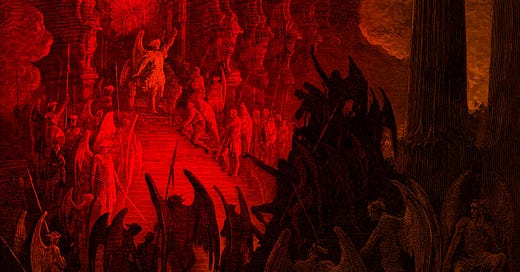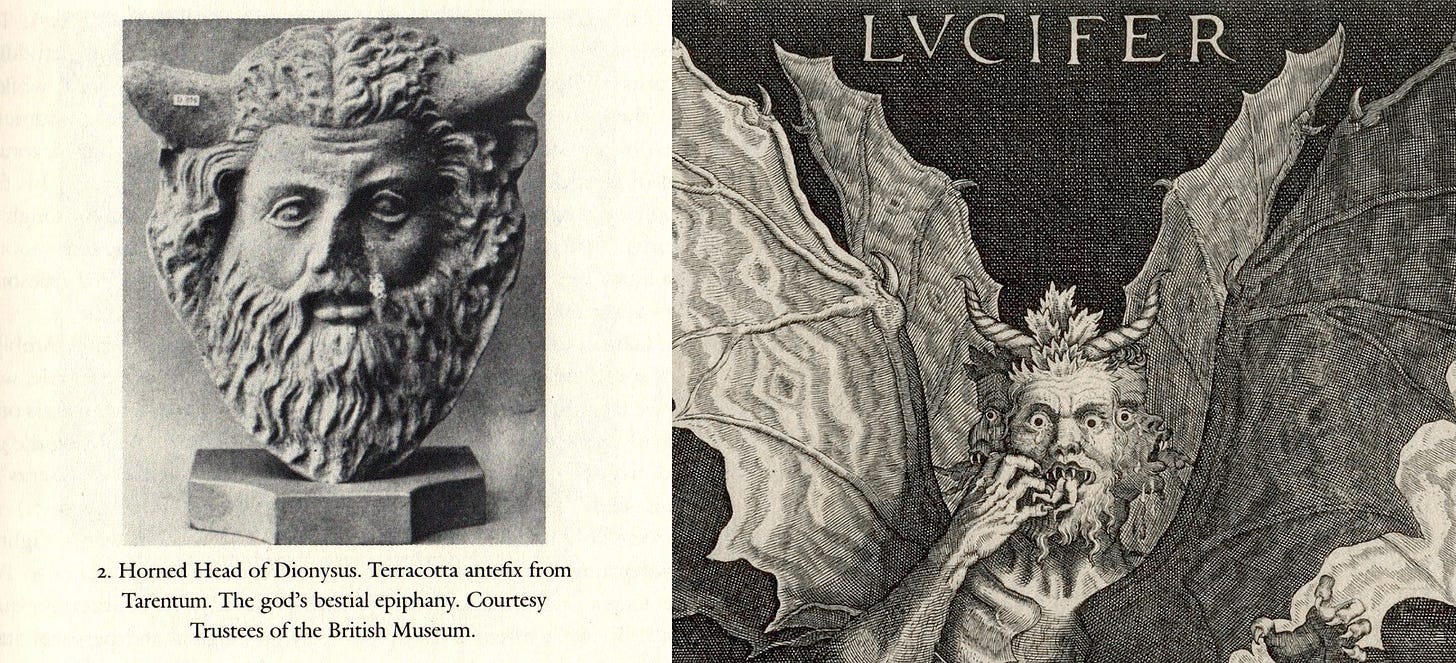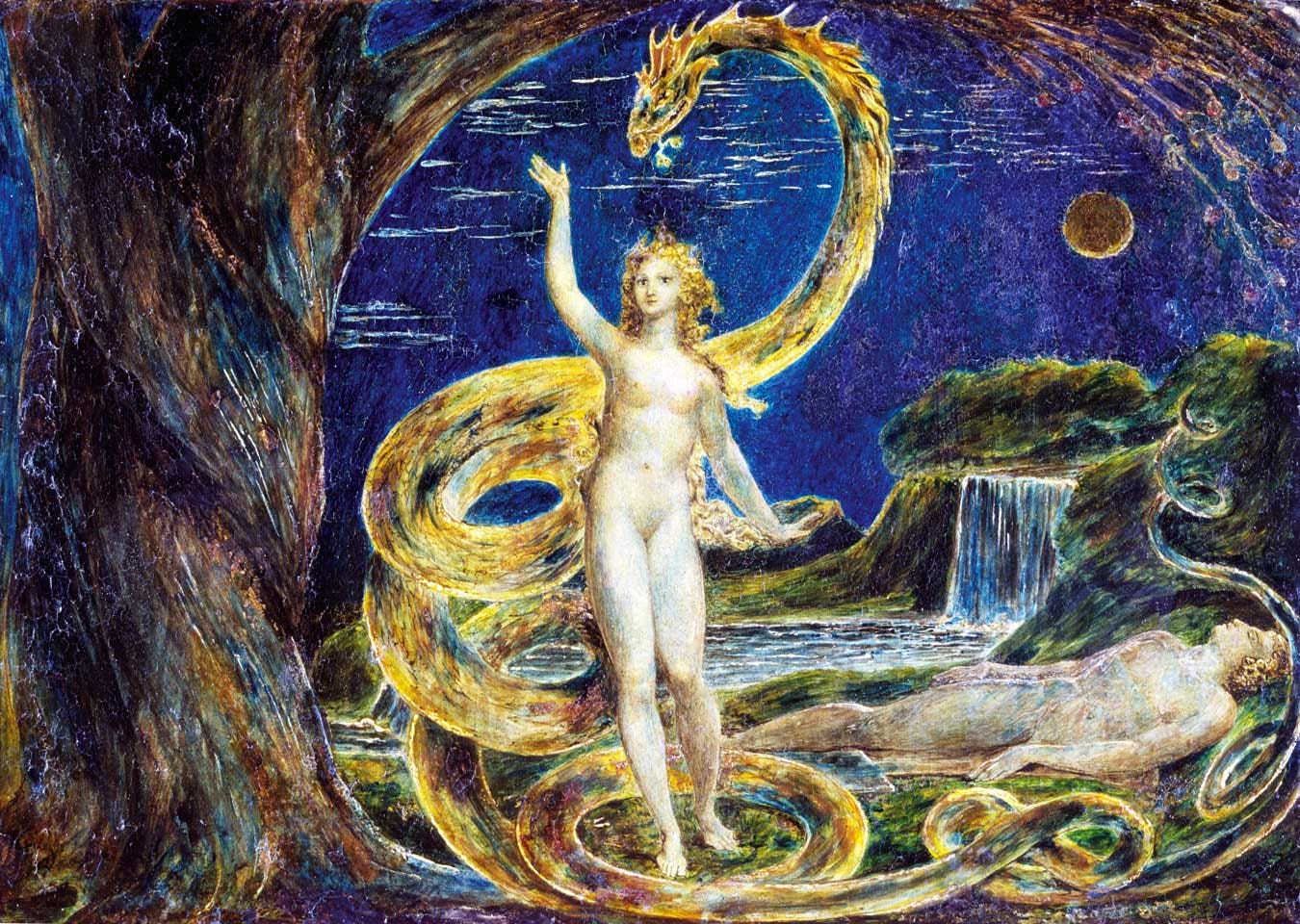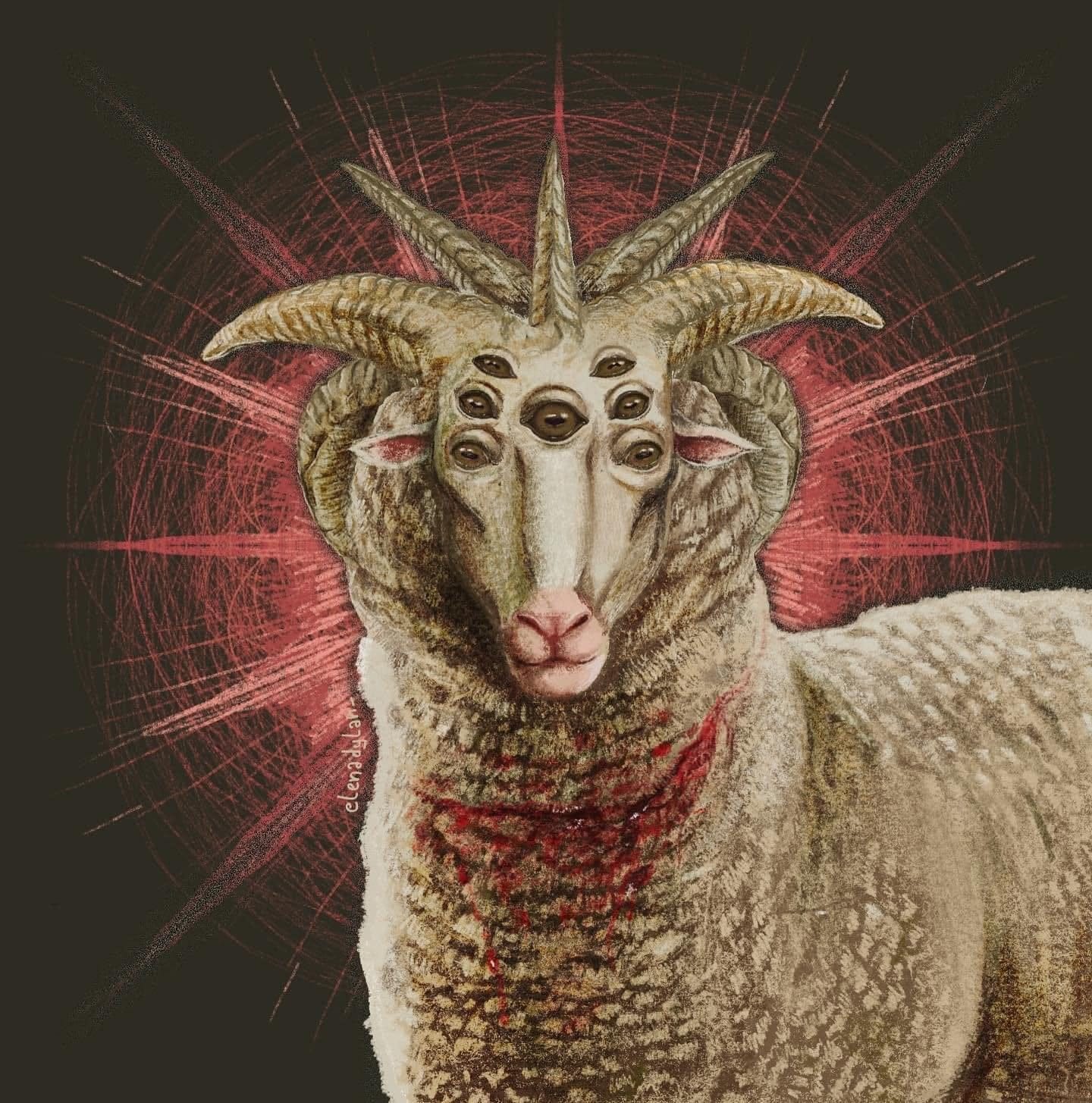I’m a big fan of the idea that the fruit of knowledge was a pomegranate.
That may seem a silly thing to have an opinion about, but we have to picture something, so I don’t think it is. Every good writer knows to let no detail be wasted.
The Greeks believed that the pomegranate was first planted by Aphrodite who the Romans called Venus. When the planet Venus appeared in the morning, they called it “Lucifer” or “light-bearer.” This widely unknown pagan god was the morning star, son of Aurora, the dawn.
The book of Isaiah in the Old Testament mentions the same being calling him by the name: Helel Ben-Shahar.
“How art thou fallen from heaven, O Lucifer, son of the morning!”
The pomegranate was also associated with Dionysus, the god of wine and drunkenness. Dionysus was often depicted and described as horned. Additionally, one of the animals associated with him was the serpent. Like Venus, he was connected with fertility, which may be the reason for their common link with the pomegranate, a fruit full of seed.
Dionysus was also associated with the bull. Astrologically, the bull is Taurus, a domicile of Venus. Taurus is the fixed sign of spring, the season in which seeds are sown. The bull may have appeared to the ancients in the sky because it was the animal with which they plowed their fields for sowing.
Here, I will allude to the other, colloquial meaning of the word “plow.”
Make of it what you will.
Some argue just as fruitlessly that the fruit of knowledge was a fig, because Adam and Eve clothed themselves with fig leaves after their eyes were opened. Figs too are associated with Dionysus. They correspond to Jupiter, the planet named after the god who usurped the throne of Saturn.
To tie all this together, both fruits are aphrodisiacs (derived from “Aphrodite”) which is to say, they make you “horny” — again, like Dionysus and like Lucifer. This points us to a long-lived debate over whether the “forbidden fruit” is a sex euphemism. Even the idea’s staunchest opponent must admit it would be a good one.
I disagree with these opponents, and in fact, I disagree with the question. The distinction is anachronistic.
In Genesis 3:5 when the serpent says: “ye shall be as gods, knowing good and evil,” the same word in the Hebrew translated as “knowing” appears again in Genesis 4:1 which reads “Adam knew Eve his wife.” In that instance, the word is explicitly a euphemism for sex, hence: “and she conceived.”
This “knowledge” is called “da’ath” in Hebrew, but in Greek it is known as “gnosis”. It refers to a kind of deep, intimate, intuitive knowledge like knowing what something feels like or knowing how to use your hands. It is not something merely read and committed to memory, but rather, knowledge which becomes a part of you.
In the book of Enoch, the sons of god simultaneously breed with human women and teach humans occult knowledge. For Enoch, these go together.
Recall again the pomegranate, the fig and the abundance of seed which they have in common. Seeds often represent ideas symbolically, but at the same time, the Greek word “sperma” which means “seed” is the root of the word “sperm.”
This is why there has always been an inextricable sexuality to the character of Lucifer, who is often called a “seducer” and connected with the ever fiery “passions.” This passional, luciferic “heat” is why we call attractive people “hot.” Nobody would ever call them “cold.”
I can concede I have done many a foolish thing “in the heat of the moment,” and you probably have as well. We always describe our passions in such terms. We may “seethe with rage,” feel “hot and bothered” or have “money to burn.” And so it’s really no wonder we say that heat “excites” molecules.
This is why in my Abraxian cosmogram, Lucifer is associated with the suit of wands and with fire — with heat and a phallus.
Those who read my article “Don’t Talk to Machine Elves” will remember the r-selected reproductive strategy — copulating as much as possible — emerges when there is an energy surplus; when the world warms up and there are excess calories to burn.
The purest image of the wand in my mind is the match — a small torch. The original Roman god Lucifer was often depicted bearing a torch. The same god was called by the Greeks: “Phosphoros,” (bringer of light) from which we derive the name of “phosphorus sulphide,” the compound which ignites matches.
Fire was the first magic and probably the best example of what Enoch meant: humans bred with fire. Our bodies changed when we began cooking, and we gained the intelligence we now enjoy because fire let it flourish. Furthermore, I am certain that the first primate to wield it with success only slept alone when he felt like it. That is why he has many, many descendants all just as captivated by fire as he was.
In short: a superhuman torch-bearing entity had children with humanity, and they are reading these words now.
The cosmic triad independently constructed by Rudolf Steiner and myself closely corresponds to the alchemical Tria Prima as well as the psychological triad of Sigmund Freud:
Lucifer | Christ | Ahriman/Yaldabaoth
Sulfur | Mercury | Salt
Id | Ego | Super-Ego
This triadic scheme is hinted at in scripture, most noticeably in the parable of the prodigal son, in which the elder son is shown to be bitter and moralistic and the younger son to be a dissolute libertine. We also see it in Revelation where one third of the angels (or stars) are said to fall with Lucifer.
Here is where we begin to understand Lucifer’s place in the cosmic order. I do not think of the id as an evil force. It is not evil when it acts in any other animal. But it is an amoral force which makes the ego do evil things. The super-ego does this as well, but there the situation is more complicated. The id is also hostile to civilization as we know it and to rules, whether they be arbitrary or not.
For this reason, Lucifer is eternally a revolutionary, ever dissatisfied with the super-ego’s world of civility, conformity and repression. The Greek Pan is another horned god; a god of nature, the opposite of civilization. He as well is often associated with fertility and sex.
Above all, such restless, wild spirits crave liberation, a word derived from “Liber,” a Roman name for Dionysus.
The great problem with Lucifer is that his admittedly enticing propositions are a sham. The id can imagine its greener pastures but it cannot chart courses to reach them because it does not understand time nor preparation nor patience nor consequence. That’s why it hates civilization in the first place.
Its superficially sound rationalizations come from its ability to seduce the higher functions into playing devil’s advocate. This is why they lead us to make choices we regret, just like the children in the Stanford marshmallow experiment, a modern re-enactment of the Edenic myth.
The repression of the id is a top-down process. The head imposing its will on the body. I prefer the word “suppression” because it means to “press down” which accurately describes the act. Pressing things down is also what gravity does.
Gravity comes from the Latin “gravitas” which means both “heaviness” and “importance” or “seriousness.” This is why important, serious things feel like heavy burdens and why we talk about being “under stress.” The root of gravitas — “gravis” — is also the root of “grave” as in “a grave expression.”
The other meaning of the word “grave” — the place a dead body goes — is probably derived from Old English, not Latin. But their convergence into homonyms should not be thought accidental, as both heaviness and death are associated with the planet Saturn who is Yaldabaoth.
We may contrast gravitas with levitas which means “lightness.” It is the root of both “levity” and “levitate,” both of which are the defiance of “gravity.” This same word however, was also used to mean “fickleness,” “inconstancy” and “disloyalty.”
We can see these opposing principles of gravitas and levitas in the figures of the king and the jester respectively.
Bear now in mind that fire rises since it is lighter than air. It also emits “light.” Again, despite no evident etymological link, I think it is no accident that light is light. The photon is massless because Lucifer, the light-bearer is in rebellion against Yaldabaoth, the principle manifest in the repressive force of gravity.
The id and its passions are the fount of creativity, which should not surprise us, because creation is conjugal. It is when two things, like a paintbrush and a canvas, unite and give birth to something new.
The super-ego by contrast is not creative but critical — both of actions and of art. The highest art involves both equally, but the creative drive itself is Luciferic which is why artists often don’t get along with traditionalists. The super-ego can only imitate other artists, because trying to be like others is what the super-ego does. It is the id which pushes the artist to innovate.
Calling innovations “revolutionary” is apt. The heretical Arianism of Isaac Newton for instance is no anomaly. You do not get Newton the scientific genius without Newton the Hermetic heretic. One either sees the world differently, or one does not. Personally, despite my essential fidelity to Nicene Christianity, I am willing to put up with Arians if some of them will be Newtons.
The heretical tendencies of great innovators should never be seen as surprising. Aleister Crowley for instance was a significant influence on many such people from David Bowie to Jack Parsons. The latter liked to recite Crowley’s Hymn to Pan before rocket launches.
A friend of mine once pointed out to me that Aleister Crowley was himself a prodigal son and we cannot regard this as symbolically insignificant.
As I said, Lucifer is inextricably linked with gnosis, which is why many heretical Gnostic sects were sympathetic to the Edenic serpent.
Rudolf Steiner likewise taught that the Luciferic spirit was artistic. Venus, the morning star, is beauty and therefore the patroness of the arts. And indeed, artists have a very Luciferic tendency. They are often antagonistic to tradition. Rock and Roll is one of the most striking examples of this, which may be why Don McLean in American Pie called Jack Flash the devil.
Lucifer represents fringy people. Outcasts, eccentrics, aliens and scapegoats. Those to whom tradition and simplicity do not come easily. It is of course the fringe, the outside, where the harshness of cold, tyrannical Yaldabaoth is most acutely felt.
But no matter what the snobs might tell you, eccentricity and transgression alone do not produce good art. The weirdest, most eccentric art lacks “substance.” I’ve said before that the word substance (sub-stance) literally means “lower posture.” Humility. This is what both Lucifer and a bad artist do not have.
What makes a sperm cell — a seed, like an idea — succeed? The answer in a word is conservatism. Sacrificing frivolous idiosyncrasies and not being too different. You need mutation, but only in cautious doses. Too much means death. Not enough means stagnation, then death.
That is why Christ is at once judge, king, Lord and “the bright and morning star.” gravitas and levitas at once. A perfect eclipse of the opposites.
Increasingly, the moral neutrality of both id and super-ego is beginning to reveal itself and I believe this is why the time is right to put forward the duality I’ve presented.
In the past, such a frame was not necessary. But perhaps now, for the first time in history, the collective super-ego has almost completely severed its ties with spirit and ancient wisdom. It has unmasked itself as a mere errant force of nature with rather few virtues to call its own.
As in Egypt, when there arises a new king who did not know Joseph, conscience calls forth as much evil as any instinct ever called sinful.
That the collective conscience tends to preserve the best moral principles is mostly accidental — a mere consequence of natural selection. It is thus, nature who keeps conscience in check, not conscience itself. The cosmic civilizational superego must eternally negotiate a peace with the cosmic natural id.
If that does not happen within, it will happen far more horrifically without.














I have been reading your stuff a bit and am a bit confused about this division between yielding to authority (yaldabaoth) as a way of living (or modus operandi) and rebellion (lucifer) as a different way of living. In this text you seem to propose a solution to these two flawed ways of living, in conservatism or rather moderation between the two. A version of the Aristotelian golden mean perhaps?
A problem i find with this however is that the slave is unavoidably a rebel, and the rebel a slave. The pious christian living in todays society will perhaps be a slave to his religious doctrine (yeilding to god), living under the iron fist of yaldabaoth, but at the same time he will be a luciferic rebel against modern society (rebelling against the world) as he renounces things generally accepted and even promoted today, like adultery, abortion and different kinds of hedonism.
At the same time a luciferian might be quite rebellious in the sense of unconventional morals (do what thou will) in contrast to conventional christian morals, but he will feel quite at home in modern society (yielding to consensus/ the world), and moreover he will always be serving under the authority of lucifer and carrying out his will.
This means that subjection is rebellion, and rebellion is subjection. These are terms that derive their meaning from contrast; who do i rebel against? and who do i follow into rebellion? It all desolves into subjectivism, only hindered by anchoring lucifer to specifik traits like heat, sex, creativity, and yaldabaoth to others like cold, discipline, rigidity. This anchoring is insufficient. For example, a cold object will have more heat than a even colder object. Something deemed creative in one situation can likewise be deemed rigid in another. Inventing the wheel in pre-colonial south america would be creative, in europe it wouldn't be creative at all (already invented).
In my writing I've attempted to initiate dialogue between my personal id and superego. I've found, at length, that both have a great deal of trouble identifying what "the good" is: on the one hand, the id finds anything personally gratifying as good, although it does not rightly think ahead of these things as "good or not" before urging actions. The superego surely has plenty of opinions, often complex, about what is "good," but in the end has little to substantiate it's moral framework when pressed: it has inherited it's sense of morals from the axiom "don't do anything that pisses anyone off" which is a fear-motivation falling ultimately outside of the realm of reason and back into the realm of instinct, back to the id.
Yaldabaoth cannot posit anything about what is good (indeed, cannot posit anything at all) without at first relying on Lucifer, who holds the creative principle, even if it then goes on to deny Lucifer. But neither can Lucifer come up with any coherent rationale for the good, since Lucifer refuses to think through anything beyond the initial perception of some pleasurable/painful phenomenon to pursue/avoid. Both end up in utter confusion when truly pressed to explain themselves. The middle principle, insofar as it borrows equally from the hot and the cold, must necessarily transcend them as much as it includes them; for out of the Christ comes the good, which neither other principle could readily supply on its own.